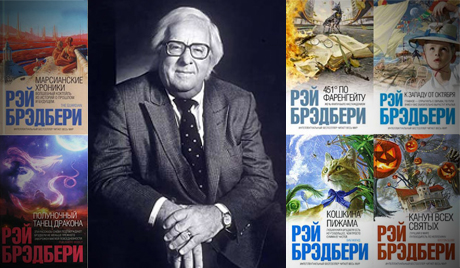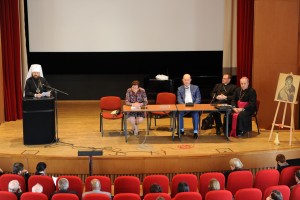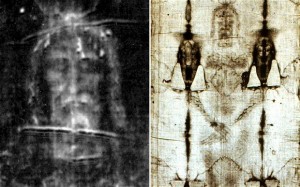Ray Bradbury, who passed away on June 5, 2012, was not only the most popular American author in Russia for more than half a century, but also one of the most beloved of all contemporary writers there. We offer the following tribute by writer Vitaly Kaplan in his memory.
Ray Bradbury has died. He was not just a writer, but a phenomenon – and not just of American, but of world culture. Now people will begin writing informative articles and literary studies about him (and in fact many had been written even earlier). I am not capable of such, since I have never specialized in the study of his works. But he meant a great deal to me.
I was eleven years old when I first saw his name; it was on the cover of the collection entitled The Martian Chronicles. I was a huge fan of fantasy back then and every new such book was of enormous value in those years of scarcity. But Bradbury’s stories were entirely unlike the fantasy to which I was accustomed: spaceships, dizzying scientific discoveries, and the romance of Communism come true… Yes, Mars was there – but it was somehow a different kind of Mars… and maybe not even Mars at all. But there was something there that even now I find difficult to express, and which would have been simply impossible at that age… Roughly speaking, there was a feeling of strangeness: something not just unfamiliar or different, but fundamentally and qualitatively other. At that time, of course, I was unfamiliar with the word “mysticism.”
Later, as I was growing older, I reread The Martian Chronicles over and over again. After I finished school, I read Fahrenheit 451 and the stories contained in a thin anthology I found in the library called Foreign Literature. Several years later I managed to get a hold of a thick red compilation volume called Of the Eternal Wanderings and the Earth. [1] That sense of otherness had not gone away, but it had been joined with poetry. I did not then know that Bradbury was not just a prose writer, but also a poet; in the Soviet era it seems that his poetry was not translated. Even now such translations are, to put it mildly, scanty. But I saw (and indeed continue to see) each one of his stories as a prose poem. Moreover his poetics – his “paint,” so to speak – was incredibly near and dear to me.
In the early nineties, when the book deficit had come to an end, I began to read Bradbury voraciously. It was then that I arrived at his novel Dandelion Wine, which to my taste is the best thing he ever wrote. I should add that in those years I was an ardent admirer of the works of Vladislav Krapivin, and Bradbury’s novel initially struck me as similar to Krapivin’s books – not in terms of plot, but of poetics. [2]
Later, however, I saw profound differences beyond the outward similarity (although not in the sense of “better or worse”), like two railroad tracks going along together that seem to lead to the same place, but actually part ways beyond the horizon. Dandelion Wine, after all, is neither just about the transition from childhood to adolescence nor just about a poetic perception of the world.
There is also a philosophy of time: that subtle pain that comes from its irreversibility and that barely perceptible shadow of death, like cobwebs in the twilight. Much later, reading his sad tale Death is a Lonely Business, written in 1999, I found myself having the same feeling I had gotten from his bright and sunny Dandelion Wine, of the fragility and spectral nature of this life, seemingly so solid and palpable.
Bradbury, incidentally, was often dark. No, that is not right. It is better to say that he saw the darkness that shows through the ordinariness of things. This is very noticeable in his stories on “children’s” themes: “The Black Ferris,” “The Playground,” “Zero Hour,” and “All Summer in a Day.” These stories are horrifying, but not in a darkly morbid way, but rather in a mystical sense. In one of our evening prayers we find the words “the seed of corruption is in me.” It is precisely this “seed of corruption” that Bradbury dragged out into the light. Moreover, this seed is nestled not just in human souls, but in the entire created world as a whole. Naturally, this comes to mind: the whole creation groaneth and travaileth in pain together until now (Romans 8:22).
But if this “seed of corruption” appears to triumph in certain of Bradbury’s stories, in other works he is able to give a worthy response to evil – above all in the tale Something Wicked This Way Comes. Written in 1962, I read it at the beginning of the nineties soon after I entered the Church – and I was amazed at how Orthodox his view of things was!
A small American town falls under the power of demons and the only ones capable of withstanding them are two twelve-year-old boys and the father of one of them, a librarian. They withstand the demons not with force of steel, but with force of spirit. Even now, twenty years later, I still agree with my assessment as a neophyte: this non-Orthodox writer wrote a book that is absolutely Orthodox in its essence.
I must admit that I do not know if Ray Douglas Bradbury was what in the West they call a “practicing Christian.” He was obviously baptized in one Protestant Church or another, but I know nothing about his faith or about his public statements on religious topics. I tried to track down information about this online, but came up empty handed. I hope that this topic will yet find an impartial researcher. But whatever the case may be, to me it is obvious that Bradbury, as a writer, exists wholly within the paradigm of Christian culture. And, to be frank, it is not all that important to me what he was: Methodist, Baptist, Presbyterian, or whatever. As a writer he is Christian.
At some point, long before his death, he wrote: “As for my gravestone? I would like to borrow that great barber-pole out front of the town shoppe, and have it run at midnight if you happened to drop by my mound to say hello. And there the old barber-pole would be, lit, its bright ribbons twining up out of mystery, turning, and twining away up into further mysteries, forever. And if you come to visit, leave an apple for the ghosts.”
Let’s go visit, brining an apple!
Translator’s notes:
[1] This anthology (which does not have an exact equivalent in English) is titled after the story “Forever and the Earth” as rendered into Russian.
[2] Vladislav Petrovich Krapivin (b. 1938) is an award-winning writer of children’s books. His books Winged Tales and August the Month of Winds exist in English translation.
Translated from the Russian..



















